
 |
|
Hidalgo (2004) Cast: Viggo Mortensen, Zuleikha Robinson, Omar Sharif, Louise Lombard, Malcolm McDowell, Adam Alexi-Malle, Said Taghmaoui, Elizabeth Berridge, J.K. Simmons, Silas Carson, Harsh Nayyar, Adoni Maropis, Floyd 'Red Crow' Westerman, Victor Talmadge, Peter Mensah, C. Thomas Howell 2004 – 136 minutes Rated: Reviewed by Dustin Putman, March 6, 2004. 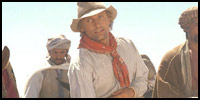 "Hidalgo" marks the second film in as many weeks that has begun with the subtitle, "Based on a true story." While such an intention is well and good when being honest, the abysmal "Dirty Dancing: Havana Nights" did not portray a true story (only its clumsy setting amidst the Cuban Revolution was an actual event), and neither does "Hidalgo" (only the hero, Frank Hopkins, and a few minor characters actually lived). Why must a film studio—in this case Buena Vista Pictures—mislead its audience into thinking what they are watching really happened when it has been confirmed that it did not? Does it give the said motion picture a larger prestige, and reassure the makers that the movie they're creating is a worthwhile one? Whatever the case, it is an increasingly cloying fad that actually achieves nothing aside from misrepresenting the subject matter and blatantly lying to viewers. Then again, if it was good enough for "The Texas Chainsaw Massacre"...
"Hidalgo" marks the second film in as many weeks that has begun with the subtitle, "Based on a true story." While such an intention is well and good when being honest, the abysmal "Dirty Dancing: Havana Nights" did not portray a true story (only its clumsy setting amidst the Cuban Revolution was an actual event), and neither does "Hidalgo" (only the hero, Frank Hopkins, and a few minor characters actually lived). Why must a film studio—in this case Buena Vista Pictures—mislead its audience into thinking what they are watching really happened when it has been confirmed that it did not? Does it give the said motion picture a larger prestige, and reassure the makers that the movie they're creating is a worthwhile one? Whatever the case, it is an increasingly cloying fad that actually achieves nothing aside from misrepresenting the subject matter and blatantly lying to viewers. Then again, if it was good enough for "The Texas Chainsaw Massacre"...
 Standing on its own two feet, "Hidalgo" is a wildly uneven yarn that plays like a hybrid between a western and a sillier-than-usual "Indiana Jones" adventure. Directed by Joe Johnston, a usually reliable filmmaker (1999's "October Sky," 2001's "Jurassic Park III") who underwhelms this time, the film purports to concern a dangerous 3,000-mile race across the Arabian desert and the brave Native American and his steadfast mustang who won it. These sequences are involving and vibrant and even exciting. They also take up less than an hour of screentime in an overlong 136-minute movie that bogs itself down with overplotting and a languid pace. There is no reason "Hidalgo" couldn't have been 90 minutes; cutting out all of the extraneous fat would have put a more notable focus on the driving force of the plot and made the whole affair easier to withstand. As it is, "Hidalgo" tests one's patience more than it enthralls and touches.
Standing on its own two feet, "Hidalgo" is a wildly uneven yarn that plays like a hybrid between a western and a sillier-than-usual "Indiana Jones" adventure. Directed by Joe Johnston, a usually reliable filmmaker (1999's "October Sky," 2001's "Jurassic Park III") who underwhelms this time, the film purports to concern a dangerous 3,000-mile race across the Arabian desert and the brave Native American and his steadfast mustang who won it. These sequences are involving and vibrant and even exciting. They also take up less than an hour of screentime in an overlong 136-minute movie that bogs itself down with overplotting and a languid pace. There is no reason "Hidalgo" couldn't have been 90 minutes; cutting out all of the extraneous fat would have put a more notable focus on the driving force of the plot and made the whole affair easier to withstand. As it is, "Hidalgo" tests one's patience more than it enthralls and touches.
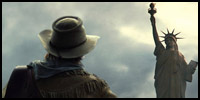 Set during the last decade of the 19th century, Frank Hopkins (Viggo Mortensen) finds himself losing all hope after witnessing his ancestral Native American family slaughtered at the Wounded Knee Creek massacre. He is further discouraged when he turns to work for the Buffalo Bill circus with his trusty mustang named Hidalgo. There doesn't seem to be any sort of a promising future for Frank until the said man-and-horse race gives him a reason for living. If he survives the heat, the modest lack of water and nourishment, and nature's unpredictable elements—not to mention finish in first place—he will walk away with $10,000. It's almost like a historical era, desert-set version of "The Amazing Race" when you think about it.
Set during the last decade of the 19th century, Frank Hopkins (Viggo Mortensen) finds himself losing all hope after witnessing his ancestral Native American family slaughtered at the Wounded Knee Creek massacre. He is further discouraged when he turns to work for the Buffalo Bill circus with his trusty mustang named Hidalgo. There doesn't seem to be any sort of a promising future for Frank until the said man-and-horse race gives him a reason for living. If he survives the heat, the modest lack of water and nourishment, and nature's unpredictable elements—not to mention finish in first place—he will walk away with $10,000. It's almost like a historical era, desert-set version of "The Amazing Race" when you think about it.
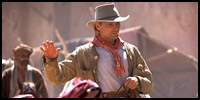 Unfortunately, an impending sandstorm and a locust attack are the least of Frank and Hidalgo's problems. When Jazira (Zuleikha Robinson), the strong-willed daughter of the royal Sheikh Riyadh (Omar Sharif), is kidnapped, Frank is sent on a mission to rescue her from ruthless Arabs. And in a bid to have her own betting horse win the race, the scheming Lady Anne Davenport (Louise Lombard) sends her minions out to kill Hidalgo and leave Frank to fend for himself on foot.
Unfortunately, an impending sandstorm and a locust attack are the least of Frank and Hidalgo's problems. When Jazira (Zuleikha Robinson), the strong-willed daughter of the royal Sheikh Riyadh (Omar Sharif), is kidnapped, Frank is sent on a mission to rescue her from ruthless Arabs. And in a bid to have her own betting horse win the race, the scheming Lady Anne Davenport (Louise Lombard) sends her minions out to kill Hidalgo and leave Frank to fend for himself on foot.
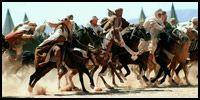 For a film whose story trajectory is all over the place and that can never seem to trust the simple, effective drama inherent in the race itself, "Hidalgo" could have turned out much worse. The first and third acts are potent and assured enough in the hands of director Joe Johnston, with a number of fine moments to diverge attention. The worn, resigned portrait captured of Frank in the opening segments is subtly powerful, avoiding easy answers and sentimentality to develop this complicated protagonist. The visual effects of the sandstorm are nowhere near as cheesy as the trailers suggest, and the setpiece is a tense, if far-fetched, one. Likewise, the final leg of the race is thoroughly exciting, aided by the tight, masterful editing of Robert Dalva, even if the outcome is a foregone conclusion.
For a film whose story trajectory is all over the place and that can never seem to trust the simple, effective drama inherent in the race itself, "Hidalgo" could have turned out much worse. The first and third acts are potent and assured enough in the hands of director Joe Johnston, with a number of fine moments to diverge attention. The worn, resigned portrait captured of Frank in the opening segments is subtly powerful, avoiding easy answers and sentimentality to develop this complicated protagonist. The visual effects of the sandstorm are nowhere near as cheesy as the trailers suggest, and the setpiece is a tense, if far-fetched, one. Likewise, the final leg of the race is thoroughly exciting, aided by the tight, masterful editing of Robert Dalva, even if the outcome is a foregone conclusion.
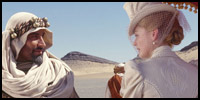 Johnston and screenwriter John Fusco (2002's "Spirit: Stallion of the Cimarron") should have trusted the rapturous pull of the race itself to be more than enough fodder for a captivating motion picture. Instead, they abandon the race altogether for at least an hour to deal with a monotonous array of subplots, each one of which could have been completely excised from the final cut and not have had any effect on the remaining footage. There is some promise, and a speck of charisma, in the relationship that grows between Frank and Jazira, but nothing ever comes of it. His valiant rescue of her from kidnappers is a hoary rip-off of 1981's "Raiders of the Lost Ark" and is protracted to ridiculous lengths. After this, there are even more dull stereotypes and story threads to deal with before the race—and the action—gets underway again. The sudden pace upstart ultimately comes too little, too late. When the third act closes in and one character remarks that there is only 400 miles left, it comes as almost a joke to the viewer. After all, how could Frank have already traveled 2,600 miles when only about twenty minutes of screentime had been afforded to the race by this point?
Johnston and screenwriter John Fusco (2002's "Spirit: Stallion of the Cimarron") should have trusted the rapturous pull of the race itself to be more than enough fodder for a captivating motion picture. Instead, they abandon the race altogether for at least an hour to deal with a monotonous array of subplots, each one of which could have been completely excised from the final cut and not have had any effect on the remaining footage. There is some promise, and a speck of charisma, in the relationship that grows between Frank and Jazira, but nothing ever comes of it. His valiant rescue of her from kidnappers is a hoary rip-off of 1981's "Raiders of the Lost Ark" and is protracted to ridiculous lengths. After this, there are even more dull stereotypes and story threads to deal with before the race—and the action—gets underway again. The sudden pace upstart ultimately comes too little, too late. When the third act closes in and one character remarks that there is only 400 miles left, it comes as almost a joke to the viewer. After all, how could Frank have already traveled 2,600 miles when only about twenty minutes of screentime had been afforded to the race by this point? 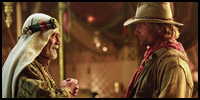 Carrying a major studio picture on his own shoulders for the first time, Viggo Mortensen (Aragorn in "The Lord of the Rings" trilogy) is in nearly every frame of "Hidalgo," and he does not disappoint. In his body language and speech, Mortensen is cool, suave, and laid-back as Frank Hopkins. Moving one step further, he is able to display a mournful complexity underneath the surface of Frank that gives him real heart. Mortensen deserves another lead part in a better movie. In supporting roles, Omar Sharif (1999's "The 13th Warrior") brings regal authority and unexpected humanity to Sheikh Riyadh, while Zuleikha Robinson (2000's "Timecode"), as Frank's would-be love interest Jazira, unmistakably resembles the one-of-a-kind Janeane Garofalo with half the personality.
Carrying a major studio picture on his own shoulders for the first time, Viggo Mortensen (Aragorn in "The Lord of the Rings" trilogy) is in nearly every frame of "Hidalgo," and he does not disappoint. In his body language and speech, Mortensen is cool, suave, and laid-back as Frank Hopkins. Moving one step further, he is able to display a mournful complexity underneath the surface of Frank that gives him real heart. Mortensen deserves another lead part in a better movie. In supporting roles, Omar Sharif (1999's "The 13th Warrior") brings regal authority and unexpected humanity to Sheikh Riyadh, while Zuleikha Robinson (2000's "Timecode"), as Frank's would-be love interest Jazira, unmistakably resembles the one-of-a-kind Janeane Garofalo with half the personality.
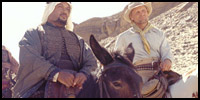 In bringing "Hidalgo" to cinematic fruition, director Joe Johnston should have trusted his surrounding talent and the horse classics of the past (i.e. 1979's "The Black Stallion") and followed their lead. Indeed, the most effective moments are the ones in which Frank and Hidalgo ride over the amazing landscapes, restoring their faith in the Earth and bonding without having to say a word. Had the race in "Hidalgo" been treated more seriously, a sort of document of what it really takes to achieve such an impossible feat, all would have been well with the finished product. The cinematography by Shelly Johnson (2001's "The Last Castle") that accompanies the race is some of the best so far this year; there isn't an image on hand that isn't utterly breathtaking in its beauty and majestic in its intended scope.
In bringing "Hidalgo" to cinematic fruition, director Joe Johnston should have trusted his surrounding talent and the horse classics of the past (i.e. 1979's "The Black Stallion") and followed their lead. Indeed, the most effective moments are the ones in which Frank and Hidalgo ride over the amazing landscapes, restoring their faith in the Earth and bonding without having to say a word. Had the race in "Hidalgo" been treated more seriously, a sort of document of what it really takes to achieve such an impossible feat, all would have been well with the finished product. The cinematography by Shelly Johnson (2001's "The Last Castle") that accompanies the race is some of the best so far this year; there isn't an image on hand that isn't utterly breathtaking in its beauty and majestic in its intended scope.
 Calamitously, the film sinks under the heavy weights of cliches, needless exposition scenes, and occasionally laughable, arbitrary subtitles. Concurrently, so little time is afforded to the key friendship between Frank and his horse that it fails to convince and endear. "Hidalgo" is not a bad film, but it is a largely misguided one that too often forgets what it should be about.
Calamitously, the film sinks under the heavy weights of cliches, needless exposition scenes, and occasionally laughable, arbitrary subtitles. Concurrently, so little time is afforded to the key friendship between Frank and his horse that it fails to convince and endear. "Hidalgo" is not a bad film, but it is a largely misguided one that too often forgets what it should be about.
|
© 2004 by Dustin Putman |














